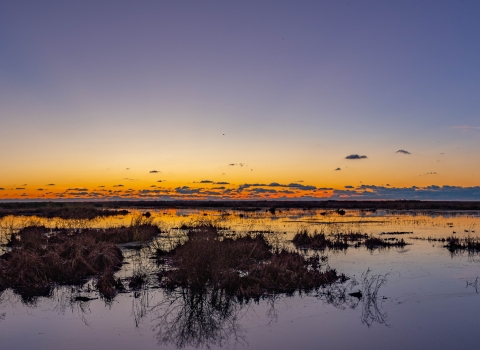Contact: Denise Rowell, Denise_Rowell@fws.gov, telephone: 251-656-3490
A draft recovery plan for the Black Warrior waterdog is now available for review and comment. Listed as an endangered species in 2018 and found only in streams of the Black Warrior River System in western Alabama, this large, aquatic salamander also has designated critical habitat.
Black to dark brown in appearance, Black Warrior waterdogs can reach up to 10 inches long. They inhabit clean, flowing streams with clay or bedrock substrates. Their habitat also features rock crevices, slabs, and submerged leaf beds which the waterdog uses for shelter, foraging, and egg laying. Water quality degradation and habitat alteration are the biggest threats to the waterdog’s survival. Habitat alteration and impoundments have rendered many miles of the flowing river reaches inhospitable to the Black Warrior waterdog. By creating more lake-like environments which are unsuitable for the species, it has become fragmented into isolated populations that are less resilient and less self-sustaining.
The recovery plan drafted for the Black Warrior waterdog includes specific criteria for determining when it should be considered for delisting, removing it from the Federal List of Endangered and Threatened Wildlife. The draft plan lists site-specific actions that will be necessary to meet those criteria and estimates the time and costs required for implementing actions necessary to achieve recovery.
To promote and support the conservation and survival of endangered and threatened species, and provide a transparent path to achieving recovery, the Service and its partners develop and implement recovery plans. Recovery plans are guidance and non-regulatory documents unique to each species which serve as central organizing tools providing important methods of minimizing threats to listed species, such as restoring habitat or removing invasive species invasive species
An invasive species is any plant or animal that has spread or been introduced into a new area where they are, or could, cause harm to the environment, economy, or human, animal, or plant health. Their unwelcome presence can destroy ecosystems and cost millions of dollars.
Learn more about invasive species . Recovery plans identify measurable and objective criteria against which progress toward recovery of a species can be tracked over time.
The Service recently revised the recovery planning process for all our species, nationwide. With this revised process, actual on‐the‐ground activities for implementing the actions in the recovery plan are described in a separate document known as the Recovery Implementation Strategy (RIS). The RIS is intended to be an adaptable, nimble operational plan for stepping down recovery plan actions into manageable, step‐by‐step activities. This adaptive mechanism is intended to allow the plan to focus on a longer, more strategic timeframe while providing greater flexibility in how we implement the recovery plan.
The Service is seeking review and comment on the draft recovery plan for the Black Warrior waterdog from local, state, and federal agencies, nongovernmental organizations, and the public. Specifically, we are seeking submission of any information that enhances the necessary understanding of the (1) species biology and threats and (2) recovery needs and related implementation issues or concerns. This ensures that we have assembled, considered, and incorporated the best available scientific and commercial information into the draft recovery plan for this species.
The draft recovery plan is available for download at the following websites:
https://www.fws.gov/program/recovery/recovery-plans
https://ecos.fws.gov/ecp/species/5426
To obtain a copy by mail, send a request to the U.S. Fish and Wildlife Service, Alabama Ecological Services Field Office, 1208 B Main Street, Daphne, Alabama 36526-4419, telephone 251-441-5181.
To ensure consideration, the Service must receive written comments on this draft recovery plan starting October 19, 2023 through November 17, 2023. However, we will accept information about any species at any time.
You may submit comments in writing by U.S. mail to Evan Collins, Alabama Ecological Service Field Office, 1208 B Main Street, Daphne, Alabama 36526-4419; or e-mail to alabama@fws.gov.
The mission of the U.S. Fish and Wildlife Service is working with others to conserve, protect, and enhance fish, wildlife, plants, and their habitats for the continuing benefit of the American people. For more information on our work and the people who make it happen, visit www.fws.gov. Connect with our Facebook page at www.facebook.com/usfwssoutheast, follow our tweets at www.twitter.com/usfwssoutheast, watch our YouTube Channel at http://www.youtube.com/usfws and download photos from our Flickr page at http://www.flickr.com/photos/usfwssoutheast



